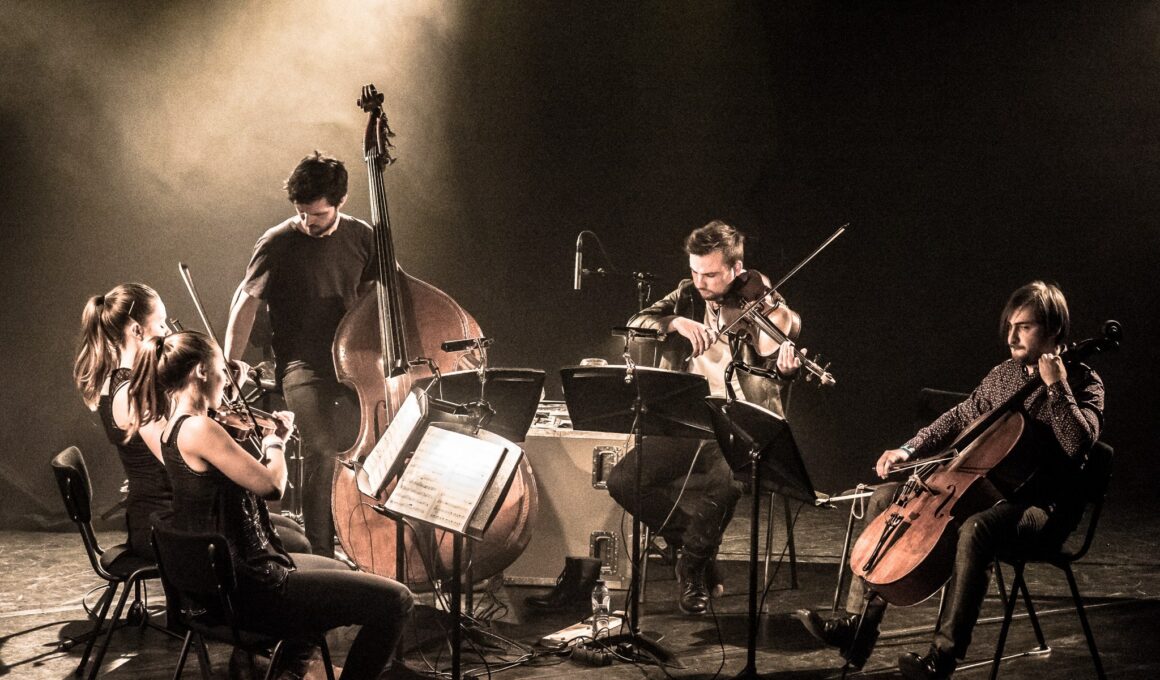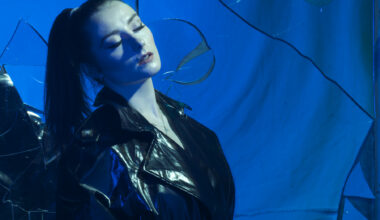Contemporary classical string quintet Wooden Elephant reimagine classic electronic-based albums and present them in their entirety as totally acoustic, longform contemporary classical concert works. So far they have reworked Björk’s “Homogenic” (2017), Radiohead’s “Kid A” (2018), and Beyoncé’s “Lemonade” (2019).
A big inspiration for the ensemble came from violist and composer Ian Anderson’s work with the London Contemporary Orchestra, with whom he worked with Radiohead guitarist Jonny Greenwood on his contemporary string chamber music, and played on Radiohead’s latest album, /A Moon Shaped Pool/. Along the way Jonny continually experimented with sound production techniques, including introducing unusual objects to the process such as plectrums and pacay shakers. His attitude and approach massively influenced these Wooden Elephant album interpretations.
Ian Anderson of Wooden Elephant offered some facts and answers for us.
FACTS
1. The greatest opening 4 notes in music history are from Marvin Gaye’s ‘Let’s Get It On’.
2. Artichoke hearts are not meat.
3. There is no afterlife. There is only death. But that just makes what we have on Earth even more special.
QUESTIONS
1. What is the biggest inspiration for your music?
The music I find the most compelling is the music that combines beauty with ugliness. The clearest example of this is Björk’s song ‘Ancestors’. Over a beautiful, slow piano melody, Bjork sighs and growls and grunts and groans, making ridiculous and horrible noises. But when combined with the beautiful piano, these negative and off-putting sounds utterly transform the music, and the music has infinitely more depth and beauty because of the presence of this ugliness. So this is the biggest inspiration for my music: the combining of light and dark to elevate beauty even further by the presence of imperfections.
2. How and when did you get into making music?
Music has been the biggest part of my life for as long as I can remember. My parents both love music, and although neither of them are musicians, they encouraged me and my siblings to learn instruments. And we were very lucky that they gave us the most amazing opportunities – surrounding is with music at home, Saturday music school, local youth orchestras, national youth orchestras… I don’t remember the moment when I decided to pursue music as a career, it was just the natural thing to do. My entire life was and is music, so why would I do anything else? And as long as I’ve played music, I’ve written music – it just came hand-in-hand.
3. What are 5 of your favourite albums of all time?
David Bowie: Scary Monsters and Super Creeps
Björk: Homogenic
Radiohead: In Rainbows
Simon and Garfunkel: Parsley, Sage, Rosemary & Thyme
Sigur Rós: Ágætis byrjun
4. What do you associate with Berlin?
Berlin was responsible for my musical ‘coming-of-age’, if that doesn’t sound too pretentious… It was through my involvement with conductor Yoel Gamzou’s Berlin-based International Mahler Orchestra (sadly no longer in existence) that I found the musicians that first made me feel totally comfortable on stage. We would play many chamber music concerts, and for the first time I felt truly free on stage, and not only able to really take risks and express myself, but actively encouraged to take those risks. That period of time with those musicians gave me so much confidence and inspiration, and it is no exaggeration to say that it totally changed my life.
5. What’s your favourite place in your town?
Following on from the previous answer, I am so happy that I now live in Berlin (but so far only for 3 weeks, so it is still very new!). I totally love any place that features water, so so-far my favourite place has to be sitting on the banks of the Landwehr Canal in Kreuzberg – it is such an amazing, relaxed, inspiring, beautiful atmosphere, and I envisage spending a lot of time there in the future.
For possible interest to travellers, my favourite places in my previous cities are:
Glasgow: Oran Mór – a beautiful old church which has been converted in to a bar and arts centre with the most amazing atmosphere. I’ve experienced many incredible nights there, both socially and culturally.
Birmingham: The Jewellery Quarter – I lived in the Jewellery Quarter for my last 2 years in Birmingham, and it it such a beautiful area with so much going on, and a really rich history. (Birmingham was the industrial heart of UK, and was known as ‘the city of a thousands trades’. For example, at one point in 19th century, 75% of everything written in the world was written by a pen that had been manufactured in Birmingham’s Jewellery Quarter.) St Paul’s Square is a beautiful green square with a beautiful old church in the middle, and there are amazing coffee shops and bars and restaurants all around. It feels very bohemian and relaxed, almost a bit like Berlin actually. And in normal times there is a lot of culture going on there too, with small venues such as 1000 Trades hosting regular jazz nights.
London: A predictable one maybe, but I just love the Southbank Centre so much. Several amazing arts venues, and right in the heart of London on the river Thames. At night it all lights up and is stunningly beautiful with an amazing atmosphere. Alternatively, The Nell of Old Drury is an amazing small pub in the heart of London’s West End which holds many amazing memories for me. In my early 20s, not long after I left music college, I got a job playing viola in the show Love Story in The Duchess Theatre, Covent Garden. It was such an exciting time for me, and the band was small and we all got on so well. I spent many happy nights in The Nell after shows, feeling like I was living the life of a proper professional musician.
Stavanger: Tou Scene is the home of Stavanger’s Tou beer brewery, and doubles up as an arts venue. It’s where I saw Lotte Anker and The Kitchen Orchestra perform (see question 9!) in a stunning, large industrial space. If you’re in Stavanger, check out what’s going in there. It’s also right by the sea with amazing views.
6. If there was no music in the world, what would you do instead?
I genuinely have no idea… I suppose looking at my other interests, I would love to be able to do comedy of some form, but I don’t have that skill set so would be a total disaster… But that’s another form of writing and performing!
Away from the arts, I am very interested in physics and history and listen to a lot of science and history podcasts, so probably I would try to pursue a career in one of these disciplines.
7. What was the last record/music you bought?
SOPHIE: Oil of Every Pearl’s Un-Insides
Absolutely stunning album of electronic avant-pop. She’s from my home town of Glasgow, but somehow I only heard of her when she tragically fell to her death in January of this year, aged only 34.
8. Who would you most like to collaborate with?
I would love to collaborate with a visual artist, as I think musical collaborations between established artists/composers are almost always a failure, or at least not either party’s best work. Something to do with the clash of composition styles, ways of working, and control of vision – it just rarely works. Think of Michael Jackson and Paul McCartney’s The Girl is Mine… I know Wooden Elephant take other artists work and create out own versions of them, but that is not collaboration – the original artist has no involvement with or control over our versions. Other art forms, however, can inspire and trigger each other. I would love to write a ballet, for example. But yes, a visual artist, although I have no idea of the form that collaboration could take.
9. What was your best gig (as performer or spectator)?
In 2016 I saw Lotte Anker perform with a small mixed ensemble called The Kitchen Orchestra in Stavanger, and it totally changed the way I approach writing music. She is an avant-garde jazz saxophonist and composer, and her music is crazy and captivating, and as aurally complex as the most complex of contemporary classical music. The whole performance blew me away, and afterwards I went up to her to tell her how much I loved it, and to ask to see a score of one of the pieces. When she showed me the score I was shocked that there were entire sections that were totally blank, with just a few text directions of how to improvise. As classical musicians we are taught to have a fear of improvising, to have an aversion of going off-page. And by ‘improvise’ I don’t mean in terms of making up a melody on the spot (which is an entirely different art-form and takes years of study in itself) – I mean in terms of experimenting with types of sounds and creating textures. This approach of handing power and expression to the performer – rather than the stereotypical ego-driven control-freakery of the Stockhausen-type of composer – is a joyous, collaborative approach to making music that I have incorporated into my music ever since.
10. How important is technology to your creative process?
Technology can incredibly helpful in the creative process, and my compositional process relies heavily on the notation programme Sibelius, but it is very important to learn how to use technology as a tool, and to avoid allowing it to dictate how your music turns out. The hardest thing when learning to compose is to learn to not be ruled by whatever compositional process you choose. So my compositional process is a combination of old-school manuscript paper combined with computers. I am gradually getting into to composing using electronics with Logic Pro and Ableton Live, so it will be really interesting to see if and how that influences my music!
11. Do you have siblings and how do they feel about your career/art?
I have one brother and one sister, and we are all musicians! So we understand each other extremely well. We all have similar tastes, so I hope that they like my music! They both sent me very nice messages about this Wooden Elephant album, and also about my alternative rock band yllwshrk’s debut album ‘I AM ALADDIN’ last year, so I think they get it. They are very supportive anyway :)
Photo © Hans Anneveldt


